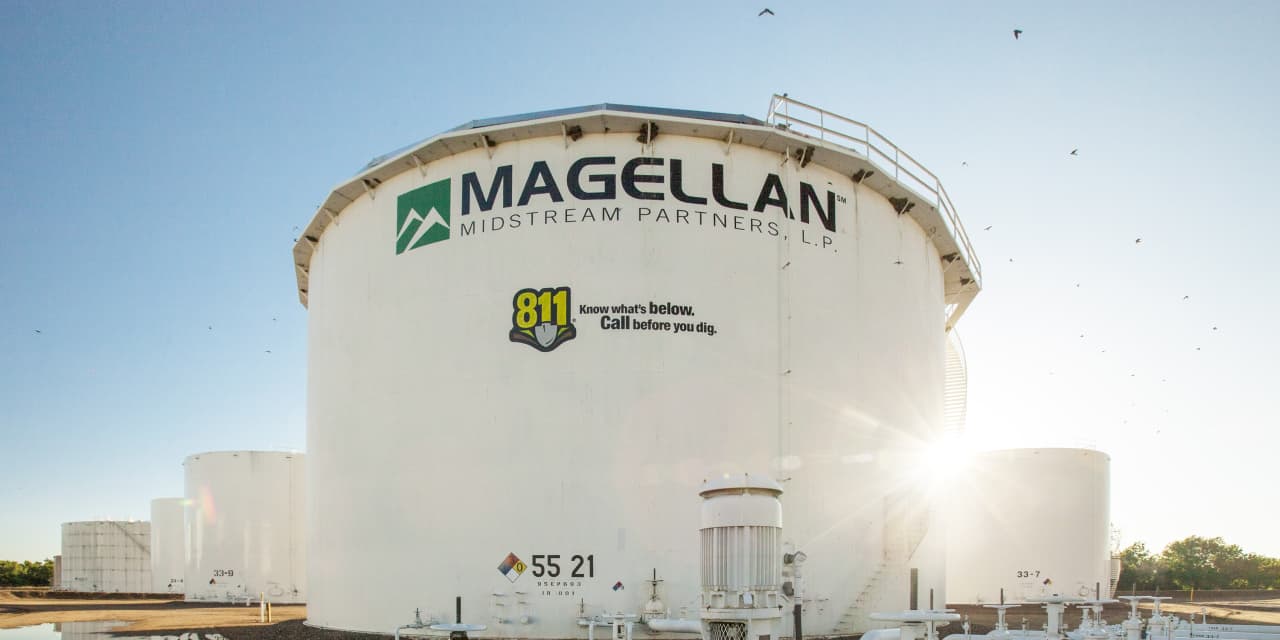The campaign by
Magellan
Midstream Partners to win unit holder approval for its $19 billion merger with
Oneok
is going down to the wire with the vote scheduled for Thursday.
The deal prospects have gotten a boost with the largest shareholder, SS&C ALPS Advisors, which runs the $7 billion Alerian MLP exchange-traded fund (Ticker AMLP), telling Barron’s that it will vote in favor of the transaction.
Andy Hicks, the senior vice president for portfolio management at SS&C ALPS Advisors, said in an email to Barron’s Tuesday that the firm is following the recommendation of Institutional Shareholder Services, an influential proxy advisory firm, which recently backed the deal between the two energy pipeline companies. Magellan is a partnership and Oneok is a corporation.
While the deal looks like it will gain shareholder approval, it’s far from a sure thing. Many retail holders of
Magellan Midstream Partners
(Ticker MMP) oppose the deal because of adverse tax consequences and many other retail investors may simply not vote. A non vote is equivalent to a no vote since Magellan needs the support of half its total units outstanding.
The view on Wall Street is that Magellan will put off the vote Thursday if it lacks sufficient support and work to gain approval rather than accept defeat. The company declined to comment.
The current unit price of Magellan suggests a good likelihood of deal approval. Magellan units were up 0.7% to $68.97 Tuesday and trade within 2% of the value of the deal, which is now close to $70.25, Barron’s calculates. Oneok shares were down 0.6% to $67.78. Oneok is offering 0.667 of its shares and $25 a share in cash for each Magellan unit.
If the deal were viewed as a sure thing, the spread might be even tighter. Given the rally in pipeline—and energy stocks generally— since the deal was unveiled in May, Magellan might fall into the low 60s if the deal is voted down, compared with $55 before the deal announcement in May.
The deal has faced opposition from the beginning. One of Magellan’s largest institutional investors, Energy Income Partners, with a 3% stake, came out early against the transaction and has lobbied hard against it, arguing that it creates a big tax hit for investors, is strategically dubious and that Magellan would be better off on its own.
Magellan longtime investors can face tax bills of more than $20 per unit because the company’s ample distributions (the yield has been above 7%) have been tax advantaged and the deal accelerates deferred taxes. Barron’s has heard from numerous individual investors who are upset about the deal and the resulting tax bill.
It’s particularly bad for older holders who had planned to include Magellan in their estates which under current law could have resulted in no taxes on all the tax-deferred income due to the so-called step-up upon death.
“EIP’s decision to vote against the merger is based on the financials presented by management that show definitively that Magellan is better off as a stand-alone company,” the firm said on its website earlier this month.
Magellan has countered that the deal offers a generous premium to its unitholders—the current value of the deal of about $70 is above the initial deal value of $67.50 and the pre-deal unit price of $55. And the company says the transaction will create a more diversified company with less overall business risk. Magellan is a major transporter of crude-oil products like diesel and gasoline and jet fuel.
There are several problematic issues, however, to gaining approval. Getting retail investors to vote is harder than for institutions. More than 40% of the units could be held by individuals.
Another issue involves the status of total-return swaps and other means by which institutional investors get exposure to Magellan and other partnerships in tax-friendly ways.
Many institutions, including pension funds and foreign investors, don’t like to own partnerships like Magellan directly due to adverse tax consequences and use swaps instead. These derivatives are also used by hedge funds and merger arbitrage funds whose investor bases include tax-exempt institutions. It’s unclear how much of Magellan is held via swap or other tax-avoidance vehicles but it’s believed to be a non-trivial percentage of its units.
The swap counterparty, normally a large bank or brokerage firm, is generally the holders of the underlying units and has the right to vote them.
It’s unclear how the banks and brokerage firms will vote. If they choose not to vote, it could make it tougher for the deal to be approved.
Voting is tricky for them since they don’t control the economics of the units they hold for swap clients.
Barron’s isn’t aware of the policies of banks and brokerage firms in voting partnership units linked to swaps—including whether they vote them in line with proxy advisory firms like ISS or not at all.
One thing that would be problematic for them would be voting their shares at the behest of their swap clients since the swap clients then could then be construed as the owners of the underlying units and subject to taxes.
“Nontaxable investors, both onshore and offshore, seek to replicate the economics of owning publicly traded partnerships without being exposed to partnership tax liability by entering into a total return swap with a counterparty such as an investment bank,” says Jim Murchie, the co-founder and CEO of Energy Income Partners in an emailed statement to Barron’s.
“The bank, if it chooses to own the underlying shares, is the beneficial owner of those shares and therefore has the sole right to vote those shares. If the nontaxable investors, under their swap agreement or otherwise, were given the right to vote the shares, it would be difficult for them to claim they aren’t the true owners and therefore not subject to U.S. tax on partnership income.”
Write to Andrew Bary at [email protected]
Read the full article here




